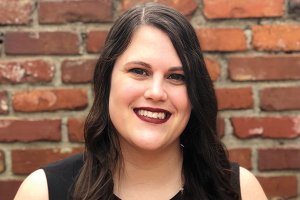Researching representation: Ph.D. candidate Michele Meyer works with the Geena Davis Institute on Gender in Media

By Beth Hatcher
Deep into the coronavirus pandemic, Michele Meyer had a moment.
She loved her studies as a doctoral student at UNC Hussman but didn’t see a career catered to her interests — the portrayal of underrepresented groups in media — playing out in academia.
So, she took to Twitter and produced a thread extolling her frustrations at the time and future hopes of finding a place for her work in industry. It went viral.
The tweet eventually racked up 14,500 likes and over 500 retweets. One of the people who saw it was Meredith Conroy.
Conroy knew a place where Meyer’s work might fit, the Geena Davis Institute on Gender in Media — where Conroy serves as vice president of research and insight.
Call it social media kismet; Conroy’s hunch proved correct. Hired as a part-time senior researcher in spring 2022, Meyer quickly moved into her current role of senior director of research and methodologies at the Institute, where she now leads a team examining intersectional onscreen representation of six identities: gender, race, LGBTQIA+, disability, age and body size.
I think I'm finally comfortable enough to share this publicly: I've decided not to pursue a career in academia br>
— Michele Meyer (@michelemeyer) April 14, 2021
Meyer took on the full-time job while continuing work on her dissertation. She expects to graduate in summer 2022.
Founded in 2004 by Academy Award-winning actor Geena Davis, the Institute works collaboratively within the entertainment industry to create gender balance, foster inclusion and reduce negative stereotyping in family entertainment media.
“It became clear that I was a good fit for the Institute and the Institute was a good fit for me,” Meyer said. “The Institute’s mission revolved around my passion of improving media representation for underrepresented groups, while my work there allows me to both help companies behind the scenes as well as produce public-facing reports.”
Meyer has co-authored reports on topics like Asian and Pacific Islander representation in Hollywood, as well as the representation of women older than 50 in films and television for the Institute.
She also works with media companies on projects like diversity audits, which document metrics on topics such as onscreen time featuring underrepresented groups in the companies’ products.
“At GDI, research surrounding media representations informs and drives change. Research tells us how far we've come, and how far we have to go. Also, people are eager for new and exciting media that reflects their experiences, or challenges their world views,” Conroy said. “Research is the foundation for recommendations that we hope will shape entertainment media, especially media that impacts children.”
Meyer knows well the impact of media on children. She was one of them, an often mentorless kid growing up in New Jersey where she looked to the screen for cues on “the right way” to be a girl. That meant fun — she started a play detective agency when “Harriet the Spy” came out — but also confusion as she navigated adolescence through an entertainment culture packed with misogyny.
Pictured below: Geena Davis. Photo courtesy of the Geena Davis Institute on Gender in Media.

“From movies and television, I learned that cool girls always had to be hot but also act like ‘one of the guys.’ It took me a while to realize that femininity is actually dope,” Meyer said. “As I got into my college years, I also became more aware of how other marginalized groups, such as people of color and the LGBTQIA+ community, are stereotyped — if they’re even shown at all — by media.”
Now, in her work at the Institute, Meyer is learning there are plenty of people pushing for change within media but changing firmly held perceptions and institutional privilege takes time, as well as a comfort with complexity.
The Institute’s data provides a framework that helps content creators develop better female characters and infuse more equity, inclusion and diversity into their content, said Madeline Di Nonno, president and CEO of the Institute. “Michele is a perfect complement to our research team. As senior director of research and methodologies, she brings great experience to the position along with her inquisitiveness and versatility.”
Two primary research tools aid the Institute’s pre- and post-production evaluation of content: GD-IQ (the Geena Davis Inclusion Quotient) and Spellcheck for Bias.
To help with her research work, Meyer has tapped other Hussman alumnae and students for her team, including Teagan Bratcher ’21 (Ph.D.), Kirsten Eddy ’21 (Ph.D.), doctoral student Sophia Noor Kiser ’16 (M.A.) and Alexis Romero Walker ’21 (Ph.D.).
“I know the impact and influence stories have on people, especially stories that are told from and consumed through the cinematic experience,” said Walker, now an assistant professor at Manhattanville College and working part-time for the Institute as a senior researcher. “I love knowing that we can influence positive change in the media industry, particularly the film industry, so that others are able to consume media that is more inclusive and thoughtful.”
For Meyer, being able to include other Hussman students and alumnae in the Institute’s work is a plus in what she describes as her ultimate “dream job.”
Her advice to other job seekers looking for the right fit? Be yourself, be honest about your strengths and your interests, and be willing to test out things you might not expect. You never know what small choices can lead to big opportunities, Meyer said.
And has she met Geena Davis? Not in person (Institute staff work remotely), but virtually a few times, the most recent at a holiday party Zoom when Davis led Institute staffers in party games.
“Geena is a delight, the whole Institute team is,” Meyer said. “And I’m just really grateful I get to do a job I love that’s making positive changes in media. I’m thankful that what I’ve learned at Hussman helped me get here.”